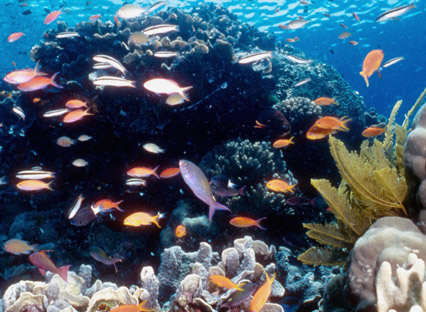Great Barrier Reef: Australia pledges $60m to halt decline
PM says government’s plan for the reef system will ‘protect it for decades to come’

A free daily email with the biggest news stories of the day – and the best features from TheWeek.com
You are now subscribed
Your newsletter sign-up was successful
Australia’s government has approved a multi-million dollar package to restore some of the damage done to the Great Barrier Reef.
Prime Minister Malcolm Turnbull said he hoped the AUS$60m (£34.5m) project for the world’s largest coral reef would “protect it for decades to come”.
The 1,400-mile reef system off the coast of Queensland is considered one of the world’s greatest natural wonders, but onslaughts by coral-eating starfish and bleaching caused by a rise in sea temperatures have inflicted serious damage.
The Week
Escape your echo chamber. Get the facts behind the news, plus analysis from multiple perspectives.

Sign up for The Week's Free Newsletters
From our morning news briefing to a weekly Good News Newsletter, get the best of The Week delivered directly to your inbox.
From our morning news briefing to a weekly Good News Newsletter, get the best of The Week delivered directly to your inbox.
Last week, the head of the UN’s environmental programme warned that “greenhouse gas emissions, plastic pollution and impacts from agriculture” had pushed the world’s reef systems to “make or break point”, The Guardian reports.
Unveiling the plans in Townsville, Turnbull said that while the reef was facing “increasing threats”, the ecosystem remained “vibrant” and “resilient”.
The largest share of the money, around AUS$36 (£20.7m), will go towards keeping polluted water away from the reef, minimising run-off pollution and encouraging farmers to plant vegetation along the coastline near the reef to reduce soil erosion.
Another $6m (£3.5m) will support scientific research investigating how to make the coral more resilient.
A free daily email with the biggest news stories of the day – and the best features from TheWeek.com
However, critics have accused the government of ignoring expert reports which found that many of the measures were ineffective.
Green party senator Andrew Bartlett said that the plans were a publicity-grabbing distraction from the real threat of industrial pollution, the ABC reports.
“If Malcolm Turnbull was serious about protecting the Great Barrier Reef he would listen to scientists and transition away from the real reef-killer, the fossil fuel industry,” he said.
The package includes AUS$10.4m (£6m) to increase the number of culling vessels targeting a coral-eating species of starfish, “despite researchers employed to evaluate the program repeatedly finding it to have failed, and potentially having made the problem worse,” says The Guardian’s Michael Slezak.
A spokeswoman from the Great Barrier Reef Marine Park Authority told the paper that improvements had been made to increase the effectiveness of the culling programme.
Another project in the pipeline proposes to reduce the risk of coral bleaching by using giant fans to cool the water prevent bleaching, a venture that a panel of experts decried as “a major departure from reality”.
-
 Political cartoons for February 20
Political cartoons for February 20Cartoons Friday’s political cartoons include just the ice, winter games, and more
-
 Sepsis ‘breakthrough’: the world’s first targeted treatment?
Sepsis ‘breakthrough’: the world’s first targeted treatment?The Explainer New drug could reverse effects of sepsis, rather than trying to treat infection with antibiotics
-
 James Van Der Beek obituary: fresh-faced Dawson’s Creek star
James Van Der Beek obituary: fresh-faced Dawson’s Creek starIn The Spotlight Van Der Beek fronted one of the most successful teen dramas of the 90s – but his Dawson fame proved a double-edged sword
-
 Epstein files topple law CEO, roil UK government
Epstein files topple law CEO, roil UK governmentSpeed Read Peter Mandelson, Britain’s former ambassador to the US, is caught up in the scandal
-
 Iran and US prepare to meet after skirmishes
Iran and US prepare to meet after skirmishesSpeed Read The incident comes amid heightened tensions in the Middle East
-
 Israel retrieves final hostage’s body from Gaza
Israel retrieves final hostage’s body from GazaSpeed Read The 24-year-old police officer was killed during the initial Hamas attack
-
 China’s Xi targets top general in growing purge
China’s Xi targets top general in growing purgeSpeed Read Zhang Youxia is being investigated over ‘grave violations’ of the law
-
 Panama and Canada are negotiating over a crucial copper mine
Panama and Canada are negotiating over a crucial copper mineIn the Spotlight Panama is set to make a final decision on the mine this summer
-
 Why Greenland’s natural resources are nearly impossible to mine
Why Greenland’s natural resources are nearly impossible to mineThe Explainer The country’s natural landscape makes the task extremely difficult
-
 Iran cuts internet as protests escalate
Iran cuts internet as protests escalateSpeed Reada Government buildings across the country have been set on fire
-
 US nabs ‘shadow’ tanker claimed by Russia
US nabs ‘shadow’ tanker claimed by RussiaSpeed Read The ship was one of two vessels seized by the US military